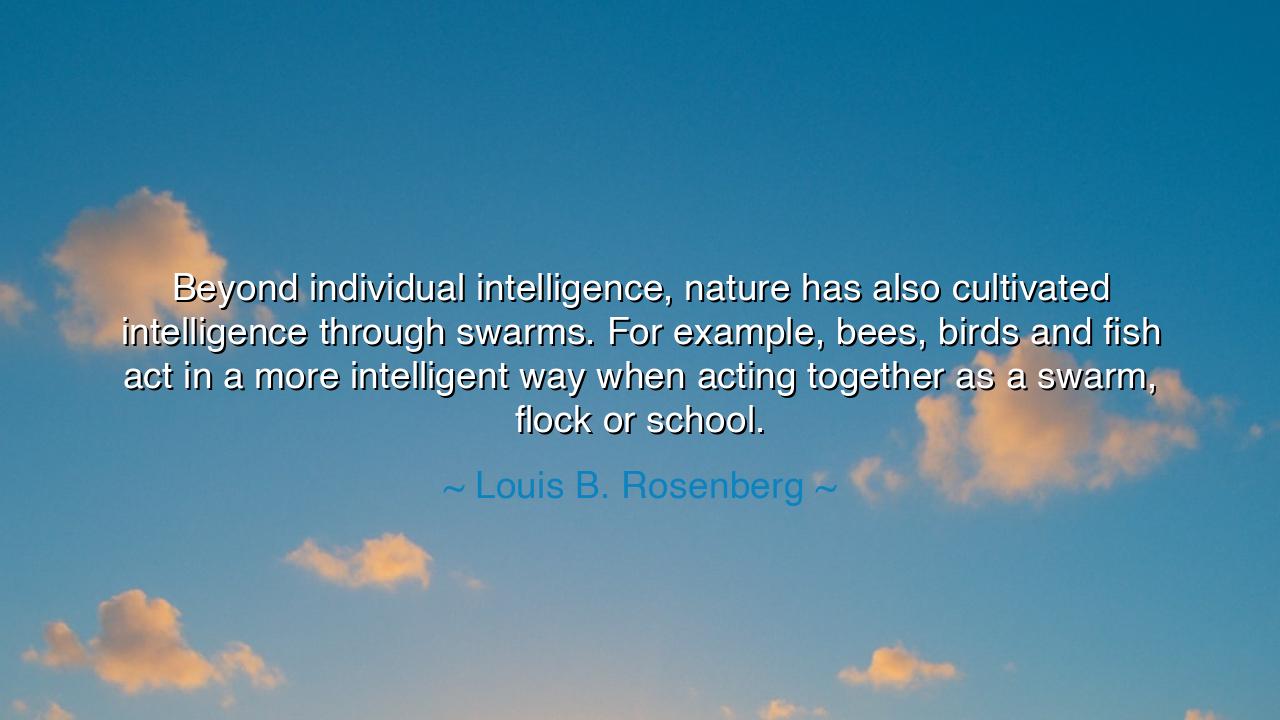
Beyond individual intelligence, nature has also cultivated
Beyond individual intelligence, nature has also cultivated intelligence through swarms. For example, bees, birds and fish act in a more intelligent way when acting together as a swarm, flock or school.






In the insightful words of Louis B. Rosenberg, "Beyond individual intelligence, nature has also cultivated intelligence through swarms. For example, bees, birds, and fish act in a more intelligent way when acting together as a swarm, flock, or school," we are invited to consider the wisdom of nature and the intricate web of interdependence that sustains life. Rosenberg speaks of a form of intelligence that transcends the individual, a collective wisdom that emerges when creatures work in harmony as part of a greater whole. In these swarms, flocks, and schools, there is a power greater than the sum of the individual parts. This collective intelligence, driven by shared instincts and communication, enables animals to accomplish what would be impossible for any one of them to achieve alone. It is a profound reminder that true intelligence is not always about individual prowess, but about the strength of unity and the wisdom that arises when individuals come together for a common purpose.
The ancients understood well the importance of community and collective action, even though their understanding of intelligence was often framed in terms of individual wisdom. Aristotle, the great Greek philosopher, believed that human beings are inherently social creatures, and that the polis—the city-state—was the natural environment for humans to express their virtue and wisdom. Aristotle argued that it is only within the context of community that individuals can truly realize their potential. Just as a bee cannot thrive in isolation, but is instead part of the hive, contributing to the greater whole, so too does a person reach their fullest expression of intelligence and virtue within the larger context of society. The collective intelligence that Rosenberg speaks of can thus be seen as a mirror of ancient philosophical ideas—wisdom is not only the product of a singular mind but is amplified through collaboration and unity.
Consider the story of Alexander the Great, whose military campaigns were not simply a reflection of his individual brilliance, but of the unity and discipline of the soldiers who followed him. While Alexander is often celebrated for his strategic genius, the true success of his campaigns lay in the cohesion of his forces—his ability to unite various peoples, to communicate his vision, and to inspire loyalty and cooperation. Much like a school of fish that moves in perfect synchronization, Alexander's army thrived because of their collective intelligence and the shared purpose they pursued. The lesson here is clear: the greatest achievements are often the result of a collective effort, where individual intelligence is enhanced through the strength of unity.
The example of bees offers a more direct parallel to Rosenberg's idea of collective intelligence. A hive of bees operates as a single, highly efficient organism, where each bee contributes to the success of the colony through their individual roles. Despite the fact that each bee is a tiny creature with limited intelligence, the swarm as a whole is capable of performing incredible feats—gathering pollen, building hives, and reproducing to ensure the survival of the species. The wisdom of the hive comes from the coordination of its members, who are bound together by an instinctual understanding of their roles within the colony. Bees teach us that intelligence is not solely a product of individual capacity, but is also a product of interdependence and the ability to work together toward a shared goal. In much the same way, our own human societies thrive when we understand the power of collaboration and the greater good that can be achieved when we unite for a common purpose.
In modern times, technology and social networks provide further examples of how collective intelligence can manifest. The internet and crowdsourcing platforms, such as , allow individuals from all over the world to contribute their knowledge to a greater pool of information. The collective input of millions of individuals results in a shared resource that is far more comprehensive than any one person could create. Similarly, the rise of artificial intelligence and machine learning is pushing the boundaries of what we can achieve by combining the intelligence of countless algorithms and datasets. Just as a swarm of bees can navigate the world with an intelligence greater than the sum of its parts, so too can human society leverage technology to harness collective intelligence for innovation and progress.
The lesson from Rosenberg’s words is clear: intelligence is not solely an individual attribute, but something that flourishes when we work together. Whether in the natural world, through bees and birds, or in human society, collective wisdom is a force that can accomplish the impossible. In our own lives, we must learn to value not just individual success, but the power of collaboration, of coming together with others to share knowledge, ideas, and resources. We must remember that strength lies not only in the brilliance of a single mind, but in the wisdom that arises when we align our efforts for the greater good.
In practical terms, this means fostering cooperation and unity in our communities, workplaces, and relationships. It means listening to others, sharing our own ideas, and working together to solve problems. Whether we are part of a team at work, a family at home, or a global community, we must recognize that our collective intelligence, when harnessed properly, can solve even the most daunting challenges. Just as a flock of birds flies in perfect formation, and a school of fish moves as one, we must embrace the power of unity and the wisdom that arises from working together in harmony. The swarm is not just a model for animals, but for all of us—an eternal lesson in the power of collective intelligence.






AAdministratorAdministrator
Welcome, honored guests. Please leave a comment, we will respond soon